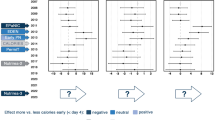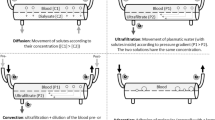Abstract
Objective
Hypophosphatemia might cause respiratory and heart failure and even death. We aimed to evaluate risk factors for hypophosphatemia and refeeding-related hypophosphatemia in patients requiring parental nutrition (PN).
Methods
This was a single-center, retrospective study. Clinical parameters were obtained from medical records. Serum phosphate (inorganic phosphorus) was measured by photometric analysis. Hypophosphatemia was confirmed when serum phosphate level was less than 0.8 mmol/L (≈2.5 mg/dl). Refeeding related hypophosphatemia was confirmed if serum phosphate level had a decrease of 0.16 mmol/L or more from baseline and if the final assessment was below 0.65 mmol/L.
Results
A total number of 655 (426 men and 229 women, aged 62.8 ± 14.8 years) hospitalized patients requiring PN were included in the study, and 60.6% of them were patients with cancer. The average body mass index (BMI) was 21.1 ± 4.1 kg/m2 and the median of serum phosphate was 0.9 mmol/L (quartile range: 0.68 mmol/L, 1.11 mmol/L). The prevalence of hypophosphatemia was 37.6% (246/655). Older age (≥ 65 years vs. < 65 years), lower serum level of pre-albumin (< 160 mg/L vs. ≥ 160 mg/L), calcium (< 2.11 mmol/L vs. ≥ 2.11 mmol/L), and magnesium (< 0.75 mmol/L vs. ≥ 0.75 mmol/L) were associated with high risk of hypophosphatemia by multivariate logistic regression (OR ranged from 1.43 to 3.06, all p < 0.05). Refeeding related hypophosphatemia was 9.5% (16/168). Serum level of calcium at baseline was significantly lower in participants with refeeding related hypophosphatemia than those without it. Total calorie and nitrogen delivered during first week of PN period showed no obvious difference between patients with and without refeeding related hypophosphatemia.
Conclusions
Hypophosphatemia is common (37.6%) in hospitalized patients requiring PN. Monitoring of serum level of phosphorus is necessary to facilitate early treatment of hypophosphatemia.


Similar content being viewed by others
Data availability
The SAS code and data that support the findings of this study are available from the first author upon reasonable request (Renying Xu, email address: 721001735@shsmu.edu.cn).
Abbreviations
- BMI:
-
Body mass index
- CI::
-
Confidence interval
- CRRT:
-
Continuous renal replacement therapy
- CV:
-
Coefficient of variance
- DNA:
-
Deoxyribonucleic acid
- EDTA:
-
Ethylene diamine tetraacetic acid
- eGFR:
-
Estimated glomerular filtration rate
- ICU:
-
Intensive care unit
- OR:
-
Odd ratio
- PN:
-
Parenteral nutrition
- RNA:
-
Ribonucleic acid
References
Felsenfeld AJ, Levine BS (2012) Approach to treatment of hypophosphatemia. Am J Kidney Dis 60:655–661
Reintam Blaser A, Gunst J, Ichai C, Casaer MP, Benstoem C, Besch G, Dauger S, Fruhwald SM, Hiesmayr M, Joannes-Boyau O, Malbrain M, Perez MH, Schaller SJ, de Man A, Starkopf J, Tamme K, Wernerman J, Berger MM (2021) Hypophosphatemia in critically ill adults and children - a systematic review. Clin Nutr 40:1744–1754
Geerse DA, Bindels AJ, Kuiper MA, Roos AN, Spronk PE, Schultz MJ (2010) Treatment of hypophosphatemia in the intensive care unit: a review. Crit Care 14:R147
Datta HK, Malik M, Neely RD (2007) Hepatic surgery-related hypophosphatemia. Clin Chim Acta 380:13–23
Hendrix RJ, Hastings MC, Samarin M, Hudson JQ (2020) Predictors of hypophosphatemia and outcomes during continuous renal replacement therapy. Blood Purif 49:700–707
Li Y, Chen X, Shen Z, Wang Y, Hu J, Xu J, Shen B, Ding X (2020) Electrolyte and acid-base disorders in cancer patients and its impact on clinical outcomes: evidence from a real-world study in China. Ren Fail 42:234–243
Sadot E, Zheng J, Srouji R, Strong VE, Gonen M, Balachandran VP, D'Angelica MI, Allen PJ, DeMatteo RP, Kingham TP, Fong Y, Weiser MR, Jarnagin WR (2019) Hypophosphatemia as a predictor of organ-specific complications following gastrointestinal surgery: analysis of 8034 patients World J Surg 43: 385–394
Crook MA (2014) Refeeding syndrome: problems with definition and management. Nutrition 30:1448–1455
Rio A, Whelan K, Goff L, Reidlinger DP, Smeeton N (2013) Occurrence of refeeding syndrome in adults started on artificial nutrition support: prospective cohort study BMJ Open 3
Friedli N, Baumann J, Hummel R, Kloter M, Odermatt J, Fehr R, Felder S, Baechli V, Geiser M, Deiss M, Tribolet P, Gomes F, Mueller B, Stanga Z, Schuetz P (2020) Refeeding syndrome is associated with increased mortality in malnourished medical inpatients: secondary analysis of a randomized trial. Medicine (Baltimore) 99:e18506
Pantoja F, Fragkos KC, Patel PS, Keane N, Samaan MA, Barnova I, Di Caro S, Mehta SJ, Rahman F (2019) Refeeding syndrome in adults receiving total parenteral nutrition: an audit of practice at a tertiary UK centre. Clin Nutr 38:1457–1463
Wong GJY, Pang JGT, Li YY, Lew CCH (2021) Refeeding hypophosphatemia in patients receiving parenteral nutrition: prevalence, risk factors, and predicting its occurrence. Nutr Clin Pract 36:679–688
Felsenfeld AJ, Levine BS, Rodriguez M (2015) Pathophysiology of calcium, phosphorus, and magnesium dysregulation in chronic kidney disease Semin Dial 28: 564–577
Kong X, Ma Y, Chen J, Luo Q, Yu X, Li Y, Xu J, Huang S, Wang L, Huang W, Wang M, Xu G, Zhang L, Zuo L, Wang H, Chinese e GFRIC (2013) Evaluation of the chronic kidney disease epidemiology collaboration equation for estimating glomerular filtration rate in the Chinese population Nephrol Dial Transplant 28: 641-651
Doig GS, Simpson F, Heighes PT, Bellomo R, Chesher D, Caterson ID, Reade MC, Harrigan PW, Refeeding Syndrome Trial Investigators G (2015) Restricted versus continued standard caloric intake during the management of refeeding syndrome in critically ill adults: a randomised, parallel-group, multicentre, single-blind controlled trial Lancet Respir Med 3: 943-952
Zhou ZR, Wang WW, Li Y, ** KR, Wang XY, Wang ZW, Chen YS, Wang SJ, Hu J, Zhang HN, Huang P, Zhao GZ, Chen XX, Li B, Zhang TS (2019) In-depth mining of clinical data: the construction of clinical prediction model with R Ann. Transl Med 7:796
Plakas S, Anagnostou E, Plakas AC, Piagkou M (2022) High risk factors for craniosynostosis during pregnancy: a case-control study. Eur J Obstet Gynecol Reprod Biol X 14:100147
Barak V, Schwartz A, Kalickman I, Nisman B, Gurman G, Shoenfeld Y (1998) Prevalence of hypophosphatemia in sepsis and infection: the role of cytokines. Am J Med 104:40–47
Cohen J, Kogan A, Sahar G, Lev S, Vidne B, Singer P (2004) Hypophosphatemia following open heart surgery: incidence and consequences. Eur J Cardiothorac Surg 26:306–310
Yoshida T, Taguchi D, Fukuda K, Shimazu K, Inoue M, Murata K, Shibata H (2017) Incidence of hypophosphatemia in advanced cancer patients: a recent report from a single institution. Int J Clin Oncol 22:244–249
Runde J, Sentongo T (2019) Refeeding syndrome. Pediatr Ann 48:e448–e454
da Silva JSV, Seres DS, Sabino K, Adams SC, Berdahl GJ, Citty SW, Cober MP, Evans DC, Greaves JR, Gura KM, Michalski A, Plogsted S, Sacks GS, Tucker AM, Worthington P, Walker RN, Ayers P, Parenteral Nutrition S (2020) Clinical Practice Committees ASfP, Enteral N. ASPEN consensus recommendations for refeeding syndrome Nutr Clin Pract 35:178–195
Zhou B, Coorperative Meta-Analysis Group Of China Obesity Task F (2002) [Predictive values of body mass index and waist circumference to risk factors of related diseases in Chinese adult population] Zhonghua Liu **ng Bing Xue Za Zhi 23: 5–10
(2017) Nutrition support for adults: oral nutrition support, enteral tube feeding and parenteral nutrition, London.
Ambrose T, De Silva A, Naghibi M, Saunders J, Smith TR, Coleman RL, Stroud M (2021) Refeeding risks in patients requiring intravenous nutrition support: results of a two-centre, prospective, double-blind, randomised controlled trial Clin Nutr ESPEN 41: 143–152
Jacquillet G, Unwin RJ (2019) Physiological regulation of phosphate by vitamin D, parathyroid hormone (PTH) and phosphate (Pi) Pflugers Arch 471: 83–98
Author information
Authors and Affiliations
Contributions
Z-YQ and Z-XM equally contributed to the conception and design of the researched, and data analysis, and manuscript draft; C-ZQ and W-JL contributed to the collection and interpretation of data; Q-YB and X-RY reviewed/edited the manuscript. All authors critically revised the manuscript, agree to be fully accountable for ensuring the integrity and accuracy of the work, and read and approved the final manuscript.
Corresponding authors
Ethics declarations
Ethics approval and consent to participate
The study protocol was approved by the Ethical Committee of Ren Ji Hospital, School of Medicine, Shanghai Jiao Tong University. As a retrospective study, patients’ consent was waived by the Ethical Committee of Ren Ji Hospital, School of Medicine, Shanghai Jiao Tong University. All methods were carried out in accordance with relevant guidelines and regulations in the declaration section under the ethics approval and consent to participate.
Consent for publication
Written informed consent for publication was obtained.
Competing interests
The authors declare no competing interests.
Additional information
Publisher's note
Springer Nature remains neutral with regard to jurisdictional claims in published maps and institutional affiliations.
Supplementary Information
Below is the link to the electronic supplementary material.
Rights and permissions
About this article
Cite this article
Zhou, Yq., Zhang, Xm., Chen, Zq. et al. The prevalence of hypophosphatemia and refeeding-related hypophosphatemia in hospitalized patients requiring parental nutrition: a retrospective study. Support Care Cancer 30, 6995–7003 (2022). https://doi.org/10.1007/s00520-022-07141-z
Received:
Accepted:
Published:
Issue Date:
DOI: https://doi.org/10.1007/s00520-022-07141-z




